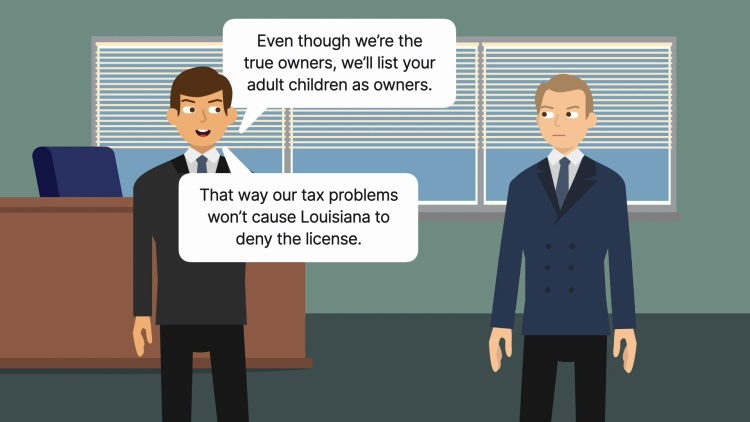Cleveland v. United States
United States Supreme Court
531 U.S. 12, 121 S.Ct. 365, 148 L.Ed.2d 221 (2000)
- Written by Samantha Arena, JD
Facts
Under Louisiana law, individuals may operate video-poker machines after successfully applying for state licenses to do so. To qualify for such a license, an applicant must meet specific suitability requirements meant to ensure that licensees are of good character. Fred Goodson owned Truck Stop Gaming, Ltd. (TSG), which participated in the video-poker business. Carl Cleveland (defendant) assisted Goodson in preparing a license application, which by statute required TSG to identify any business partners, as well as to pay various processing fees. Because Cleveland and Goodson had tax and financial problems that could have reduced their ability to obtain a video-poker license, TSG’s application named Goodson’s adult children as the sole owners of TSG. The state approved the application, and TSG successfully renewed the license three times subsequent to the initial approval. Each renewal application identified only Goodson’s adult children as owners of TSG. Later, the federal government found that Cleveland and Goodson had participated in a bribery scheme targeting state legislators to obtain votes in favor of the video-poker industry. The government charged Cleveland and Goodson with multiple counts of racketeering and conspiracy. The predicate acts supporting these charges included four counts of mail fraud under 18 U.S.C. § 1341, which proscribes the use of mail to further any scheme to (1) defraud or (2) obtain money or property by means of false or fraudulent representations. Cleveland and Goodson were accused of violating the mail-fraud statute by fraudulently concealing that they were the real owners of TSG in the initial and renewal applications mailed to the state. Before trial, Cleveland moved to dismiss the mail-fraud counts, arguing that the fraud had not deprived the state of property under the statute. The district court denied the motion, and a jury found Cleveland guilty. The United States Court of Appeals for the Fifth Circuit affirmed Cleveland’s conviction. The United States Supreme Court granted certiorari.
Rule of Law
Issue
Holding and Reasoning (Ginsburg, J.)
What to do next…
Here's why 907,000 law students have relied on our case briefs:
- Written by law professors and practitioners, not other law students. 47,100 briefs, keyed to 996 casebooks. Top-notch customer support.
- The right amount of information, includes the facts, issues, rule of law, holding and reasoning, and any concurrences and dissents.
- Access in your classes, works on your mobile and tablet. Massive library of related video lessons and high quality multiple-choice questions.
- Easy to use, uniform format for every case brief. Written in plain English, not in legalese. Our briefs summarize and simplify; they don’t just repeat the court’s language.





